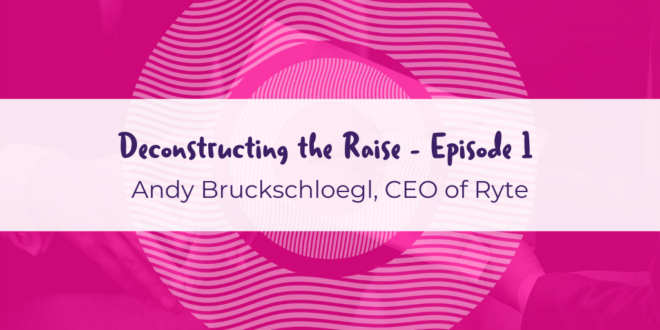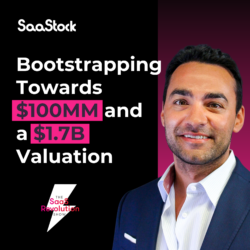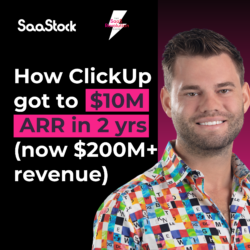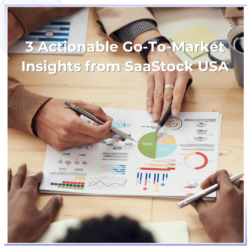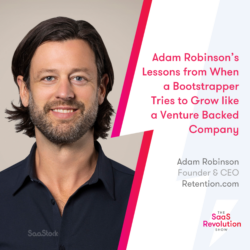If you are not subscribed, join the community by subscribing here and share it with your fellow SaaS enthusiasts.
“Fundraising isn’t about scaling… it’s about building a good relationship“, said Andy Bruckschloegl, CEO of Ryte, in SaaStock’s Deconstructing the Raise Show.
Sending an extensive extended pitch deck, as a follow up to your initial ‘teaser’ pitch deck, isn’t always ideal.
You have to deal with the investor’s questions directly.
With a ‘ping pong’ style approach, you can book a lot of calls, start email conversations, and so on, to really dive deep into what the investor is on the lookout for. Simultaneously, you’re getting to know each other on a much more personal level, helping you build a strong relationship – which is the most important thing for fundraising.
Listen to the first episode on our latest podcast show, Deconstructing the Raise, where the CEO of Ryte shares the ins and outs of how they raised a €6.5 million Series A round, and his lessons learnt along the way. You can also read the full transcript below.👇

Transcript
Alex Theuma
Welcome to the first episode of Deconstructing the Raise. So Andy, and I’m going to pronounce this correctly, Bruckschloegl, you are the co-founder and CEO of Ryte. You’re also the co-founder and CEO for… Or co-founder of a few other businesses. But today we’re speaking about Ryte, which is a Munich based SaaS company that recently raised a very tidy round. When I say tidy, not tiny, just to kind of clarify that. So a good round.
And what we’re going to do is we are going to break this down and really understand how you did it. And share these learnings with our listeners. So starting from the top, Andy, can you tell us how much you raised, from whom, and what stage of funding round it was?
Andy Bruckschloegl
Sure. So we raised €6.5 million for our series A funding round. The round was led by Octopus Investment Development Capital team, a part of the Octopus Group. With the support of SEK Ventures, which are the founders investment firm. As well as Mayflowers and some existing shareholders.
Alex Theuma
Okay. Andy why did you partner with this lead investor?
Andy Bruckschloegl
So for us Octopus is really the perfect fit. So first, and this is very important for us, we had great conversations with Paul Davidson, Adam Said, and Sarah , the operating team from Octopus. And a very good feeling from really the first second on that we shared the same values, and had a common understanding of the market and the general business growth strategy. Second, Octopus has over £9.1 billion under management. And then really for us impressive track record of portfolio companies. And because every business in the world needs our platform, it was very important for us to have an investor with really deep pockets.
Alex Theuma
Oh, awesome, 9.1 billion. I didn’t know that, but yeah, definitely that’s huge and great to hear. So you said there, I think this will be some good background information for the listeners, but every customer in the world or everybody in the world needs your product, something like that. What is your product? What is Ryte?
Andy Bruckschloegl
So Ryte is the platform for website quality management. So meaning that we crawl your website and afterwards we give you the most comprehensive analysis about your website. This is very important for improving your user experience, UI, and also improve your Google rankings for SEO.
Excellent. So you’re in a big market and we know that VCs like companies that are in a big market.So that’s good. And so where did you first meet Octopus?
Andy Bruckschloegl
Funny enough we first met Adam at the first digital SaaStock around June, I think it was, and pitched him Ryte.
Alex Theuma
Amazing. And this was obviously we were using Hopin. Was this during the main event? Because we were running also a little side startup program. How did that come about?
Andy Bruckschloegl
I think that it was the main event in June. The first one really during the pandemic where I think you made the first try to do it completely virtual. And it was, as you can see, a very big success. And I participated at some talks and also met a lot of good investors there.
Alex Theuma
Yeah, amazing. Well, that’s great to hear. We’ve got the next SaaStock Remote coming up in February. We moved it from June to February to bring an important conference into the beginning of this year, to help our community. And it’s great to hear that we’re adding value in that way. And actually, I mean, it’s something that SaaStock is quite well known for, in connecting SaaS founders together with SaaS VCs over the years. But great to hear the success stories.
And so you met them at SaaStock Remote, but you mentioned that this was obviously initially back in June. We are speaking and it’s now end of Jan, although you announced a couple of weeks ago. How long did the actual process take then? What was it? Was it six, seven months? Or was it less?
Andy Bruckschloegl
So, as I said, the first conversation was in June and we signed mid December, so in total it was six months. Whereas a lot of time passed between the first conversations, and then the last three months we worked almost on a daily basis to close the deal.
Alex Theuma
Amazing. And so on the last three months you were working on a daily basis, was that then your sole focus? Or were you doing it a few hours a day? How did that work? How much time were you spending on the business versus how much time getting this deal done with the VCs?
Andy Bruckschloegl
Yeah. I think it was some hours a day, so not the whole day. Because during COVID you have to focus on your business and really have to make sure that everything is running smoothly. So for the two reasons we couldn’t focus for 100% on fundraising, unfortunately.
Alex Theuma
I mean, do you think, you mentioned COVID there, that because of obviously what the world was going through and still is in many respects with the pandemic, with COVID, that that slowed it down in any way? What are your thoughts?
Andy Bruckschloegl
Yes, I think so. And especially in June when we spoke to many investors there. We recognized that many said, “Yes, we are interested,” but really I don’t think they were. They were more in a mode like, “Okay, I’m keeping up the speed, keeping up conversation.” But in my understanding of what I had seen and had heard, unfortunately half of them were really interested on doing fundraising and the others were more in a wait and see position.
Alex Theuma
I saw a lot of that in the market, for sure. And, I mean, do you think when you look back at it now, and obviously it’s great that the deal was done in six months, it’s not too bad a time. It’s actually the outcome, I guess, that matters. Is there anything that you think that you could have done to speed up the process? Or do you think it went to the time that was meant to be, nothing could have been done in retrospect?
Andy Bruckschloegl
Yeah. So, as I said, so under normal circumstances, certainly. But during COVID obviously not. So COVID brought up a number of unforeseen circumstances, which is why I had to take care of our business with my CFO. And for that reasons we could not focus for 100% on fundraising.
And, by the way, it’s really important to mention, we haven’t met one until today. We have only talked virtually and I’m really looking forward to meeting the team in person. So this is for sure another very important point to mention that if you don’t have the chance to actually meet in person, it makes it more hard than really having a good conversation, seeing each other, feeling each other.
Alex Theuma
Yeah. No, a good point. And definitely I think very commonplace from last year with seeing that… Well, in fact, I remember, short anecdote, that Alex Kayyal from Salesforce Ventures, was saying that they’ve never invested in a SaaS company, or a SaaS founder, that he’s not met in person. And then not long after that they made an investment in Hopin, which is the platform that we were using. And I don’t actually know if he… I think that was done over Zoom, but I can’t be sure.
But certainly what we saw was there was a lot of that mentality, understandably, from VCs believing that we couldn’t invest in a founder if we’ve not met them in person, because that’s so important to understanding whether we do it. Because it’s a very important decision, a relationship that you have to build. But because of the circumstances, people did see, “Well, we can’t really just sit and wait, we’ve got to find the best way. And we’ve got to do it online.” And it’s good to see that VCs were still open for business.
And so we know who the lead VC was. And how many VCs followed within the round? Or how many investors within the round itself?
Andy Bruckschloegl
So Octopus was the lead investor, and then SEK and Mayflower. So two followed so far. But there was the first closing and maybe we have some kind of a second closing. We are still in some good discussions after we announced the fundraising series A round.
Alex Theuma
Okay, interesting. And to confirm, I mean, probably you did mention it at the beginning, but this was an A round? Sorry if I didn’t hear that correctly.
Andy Bruckschloegl
Yes. It was an A round. We have done three years ago a seed round, the first round, after five years of bootstrapping. And now we have done the series A for our growth phase now.
Alex Theuma
And so you got a couple of investors in there, obviously Octopus being the lead. How many investors did you meet in total before you got that yes? And I guess I’m curious to know how many nos did you get to get to the one yes?
Andy Bruckschloegl
I know, again, for instance, when I spoke to the founder of Aircorp he said that initially in those early days they had 100 nos before they had that one yes. But obviously it’s the one yes that counts. But it’s quite almost soul crushing to get 100 nos, but you persist and then you get that one deal from the VC.
So, as I said, so three years ago in our seed round, it was exactly that number because there we counted it. To be honest, I haven’t counted it. And for this round we really had the great honor that we had four offers from potentially investors on the table and were in the comfortable place to choose the perfect fit for us. And especially during COVID, I think that’s really, as I said, a great honor to have the four offers.
Alex Theuma
Okay, awesome. And, I guess, what was the big reason that they chose to invest in you? So obviously we mentioned that there’s a big market, maybe there’s some good metrics. What what were the reasons they gave?
Andy Bruckschloegl
So for sure it’s a very good question, and I think you should better ask Octopus directly. But, nevertheless, let me summarize what I understood. They believed that the website quality management category is a massively growing market. They invested because they were impressed by our talent, fascinated after seeing our platform. And they know how to support us to expand across Europe and beyond.
Alex Theuma
And what are the metrics that you could share that were in the pitch deck that helped clinch the deal?
Andy Bruckschloegl
So unfortunately I can’t share the actual metrics, but it was our growth rate and our efficiency to acquire big enterprise customers. Additionally, they were very impressed that we would support over five years and build an extremely cost efficient setup.
Alex Theuma
Yeah. It is definitely VCs, as you said. And for those listening they do love to see that if you’ve been able to bootstrap a company and generate revenue, I guess, your growth is based, you’re customer funded, prove that kind of success. That’s always great, strengthens your position when you’re having these meetings with VCs. So good to see that that was the similar pattern here with you guys.
So I speak to a lot of VCs in my job at SaaStock. And a lot of them are on the podcast that I do, which is the SaaS Revolution Show. And last year definitely I was hearing it’s all about storytelling at that early stage. The founder really has to tell a good story and the VCs really need to believe that, the importance of storytelling. So I’m just curious to hear what was the story that you told? And any insights into that?
Andy Bruckschloegl
So I think it was not the only thing, so it was mixed between… I think they were especially hooked after seeing our growth rate, especially as we have no extensive international activity so far. So I think that was the most thing. But besides that, for sure, as I said, it was the team. And last one at least our vision. So, because our vision is to become the foundation for digital success, so adding more channels besides the website. And I think, especially regarding this big vision, they got even more hooked after having seen what we achieved so far.
Again, I mean, obviously it probably goes without saying that VCs, they want to back ambitious founders, ambitious companies. They don’t want to back companies that are just going to generate 1 million or 10 million ARR. But they’re looking for the unicorns and now the decacorns, and so on. So just curious, where did you pitch yourselves to say, or did you have to, to say that, “We are going to be a decacorn. We’re going to be worth a billion,” or whatever. To get them excited, to show that you had that ambition.
So it was not that one we choose, so it wasn’t like, “Okay. We would like to be the decacorn,” and so on. Because I think that’s not a good vision and driver for a business. Is it was more like, “Okay, we really would like to be the foundation for judging success for every business.” So what I mentioned in some questions before, that really every business needs right.
Then we had a call with one of their portfolio customers where we analyzed their website and then gave them a very comprehensive analyze about their website. And especially after they’ve seen this analysis, and after the head of growth marketing from the portfolio company have seen it, they were very, very impressed. And have really seen that this is some kind of a standard tool in the business. And this was something which was extremely important for them.
And, as I said, because Octopus really invest in cost efficient companies. And what I already said as well, after they have seen how good we set up this process with marketing, with then customer services and so on. Because in the past we only raised 3 million in our seed round, and this was three years ago. So we really grew by our own revenues. And this was very, very important for them. And for them it was more, “Okay, if they are only focusing in Germany, and if they have such a good cost efficient set up, then if we put money on this system or machine, then it will grow a lot.” And this was the reason why they, I would say, get really, really hooked.
Alex Theuma
I would be as well with that sort of story. And we’re talking, we’ve seen the success, we know how long a time that it’s taken. We understand the…actually, I mean, it’s pretty reasonable and certainly reasonable within the period of the pandemic that we were all going through. And you’ve got the money, I guess, and the, I would imagine, the valuation that you wanted. But there’s always challenges when you’re going through the fundraising process, of some sort. Sometimes bigger than others. Was there anything, any unforeseen hurdles that you had to overcome in going through this process?
Andy Bruckschloegl
Yes. Luckily we had another director, but what I already mentioned as well was I think it was a shame that we couldn’t meet and get to know each other in person. So that was something with both teams, so Ryte and Octopus, were very, very sad about. But nevertheless, we made it and are really happy about it.
Alex Theuma
That definitely is a hurdle to overcome and something that you did. And what about the legal side of things? Is that something that you had experienced any challenges with? And, again, what support did you get? And what was this structure of the deal?
Andy Bruckschloegl
So within Ryte we created a team which we called the Deal Team, and this was with my CFO, Tino Mittelmeier, and also my co-founder and our strategic advisor Niels Dörje. So Niels is very experienced, already built and sold a company. And this was on our side. Additionally, on the legal side, we worked with Felix Stützer, so chairman guy from Lupp + Partner, chairman lawyer, who is focused on fundraising and M&A, and that was very, very helpful for us to have such an experienced lawyer on our side. Which led the whole process within Ryte, but also with the Octopus team and all the existing shareholders.
Alex Theuma
And outside of the legal side of things, were there anybody from your team or externally involved in the fundraise? Was it just you? Or, again, did you have any additional support that you needed maybe in creating the deck materials, getting the information together? And sometimes you also hear about, I don’t know necessarily whether it’s series A, but perhaps sometimes that there are, whether it’s non-executive directors or third party consultants that help companies fundraise. So was this all you, or was there other people within the team to help get it done?
Andy Bruckschloegl
So luckily we had no external M&A advisors, so we have done everything in-house because of the fact that my CFO, Tino, and also my head of business, Georg, they both are coming from a consultant company. And for that reason they are extremely good in building slides and preparing everything. And for that reason it was possible for us to do it in-house.
Regarding the process and the team there, for sure, at a specific stage my whole exec team was involved in the fundraising. But not at the beginning, so the beginning was with our Deal Team, so the three of us. And then at a specific stage, then we introduced our whole exec team. And then they had a lot of discussions, or one-on-ones, with them to learn them, to learn more about their department and so on.
Alex Theuma
Awesome. And I first heard about data rooms a couple of years ago, a VC spoke at a SaaStock conference and did a presentation on data rooms. Did you build a data room for this? And is this something that you just keep up to date in the event that you’re going to be raising?
Andy Bruckschloegl
So for sure, we set up our data room. And we have done it with a tool named Drooms, which we can recommend. It’s a bit expensive, unfortunately, but it’s extremely good.
Alex Theuma
How do you spell that? What’s the name?
Andy Bruckschloegl
It’s Drooms. D-R-O-O-M-S.
Alex Theuma
And this is something that you just keep updated on a how regular basis?
Andy Bruckschloegl
Exactly. And then after the fundraise you can close the data room and everyone gets an… How do you say? Some kind of a back up from it. And this was very, very good regarding the process, that they have such a good software provided to us. And there we had no issues on providing access, taking away access from some investors, and so on. It was a very, very good one central place for everyone. And really see everything on the analytics, who was accessing which data and so on.
Alex Theuma
Awesome. And your pitch deck is obviously a key part of the whole fundraising process, right? And something that companies shouldn’t take lightly, startups shouldn’t take lightly. I’m curious to see how long did it take you to create the pitch deck? What was around the design? How much time and effort did you spend on the design? And how many slides, just infos on the pitch deck would be good to know?
Andy Bruckschloegl
So, first of all, regarding the time we needed, it was four weeks for the first version. And then we iterated it after almost every pitch, which was very, very good. And I really can recommend doing this to every founder.
Regarding the slides and the length of deck, we had a teaser deck with 18 slides and an extended deck with 90 slides where we explained really everything. But, to be honest, I would not recommend creating such an extensive extended deck. The problem with this is that you send out really everything you have and that the investors then come back with too many questions, risks, and so on. I think lessons learned it’s much better to answer questions directly and to strengthen the relationship during this conversation. That happened finally by accident with Octopus.
Alex Theuma
Yeah. I mean, 90 slide deck, certainly very, very comprehensive. I guess it shows that you guys left no stone unturned. But certainly within the VC meetings, which happened online, giving them the shorter version and focusing on, I guess, the key information is good. But great that you had this comprehensive set of data to share with them.
And then looking at, obviously, as you said, you met Octopus in June. So that the process started with them then, and we closed that down in December. Obviously you met them at SaaStock, but I imagine that you probably had reached out to some other VCs before then. How did you sort of start the process of series A, and start the reach out, and the planning of which VCs that you want to meet? Did you have a target list or did you just say, “Well, let’s go into all the SaaS VCs”?
Andy Bruckschloegl
So first we started to reach out to some investors, I would say, from our network, or we were already in contact to learn from them for the first steps, which I think is very important. And I can recommend as well. And then, as already mentioned, we bought a ticket for your virtual SaaStock. I think it was €149, so it was a very good price. And met many great contacts there. So sorry for kind of giving you an ad, but I really can recommend this. And I will do it in the future as well.
Alex Theuma
No, we appreciate it. And actually, I don’t know why, but we’ve lowered the price, so the price is $59 at the moment to attend SaaStock Remote. So hopefully we’ll find the same value that you’ve had, either for people that are listening or just generally in SaaS founders. And this is why we do what we do, so it’s good to hear, as I said, those success stories.
And now, because we started from the top of the point, where you’ve raised this 6.5 million series A. But as we’ve worked our way right down to the beginning. And so, I guess, from what you know now, what would you do differently? If anything?
Andy Bruckschloegl
So it’s a bit like, as I said in one of the last questions, I would not have created such an extensive extended deck and sent it out directly after we presented our pitch deck, our teaser deck. But would have dealt with the questions directly.
For sure this doesn’t scale as you are usually doing if you are in the SaaS industry, but very important to mention fundraising isn’t about scaling anyway, it’s about building a good relationship. And for that reason I really would like to do some kind of a ping pong with the investor and really present, first of all, your teaser deck, your 10 to 20 slides, and then answer to every question. Have a lot of calls, a lot of email conversations, and so on that you learn each other, know much, much better. And then you can build a very, very good and strong relationship. Which I think at the end is the most important thing for fundraising.
Alex Theuma
Great advice there. And, Andy, two final things that I want to know, and thanks for being really comprehensive and answering all these questions. Two final things was when you found out or you knew that the deal was done, you’d signed the paper and that 6.5 million was going to be wired to the right bank account. Did you celebrate on that day? And how? Is the first question.
Andy Bruckschloegl
Yes, for sure we celebrated it. It was four, five days before Christmas. And in this day we had our virtual live Christmas party. And there, before that, we sent to all of the Ryte-ies a bottle of champagne. So we sent it to everyone and celebrated it together, which was extremely cool.
And then I think really everyone went to Christmas because of having a very, very tough and crazy year, last year. But typically we are doing this kind of celebrations at a Greek restaurant which is very close to our office and have there great, great parties. Unfortunately, this time it wasn’t possible, but for sure in the future, after the lockdown, we will have some kind of then a real, additional party about the fundraiser.
Alex Theuma
Sounds good. Yeah, it’s definitely difficult celebrating virtually. It’s certainly not the same as celebrating in person.
Andy Bruckschloegl
It’s so sad. Yeah, I think if you have a strong culture and you really have a drive, and a very party culture. So especially if you have this two things, then it’s so sad that you can’t celebrate, that you can’t drink together, that you can’t hug. So this is so sad, I can’t describe it, to be honest.
Alex Theuma
Yeah. Well, with the vaccines it hopefully will be changing towards the second half of this year, if not sooner. And, again, so then the money is in the bank. What is the plan? How are you going to spend it to help grow the business?
Andy Bruckschloegl
So we would like spend it in two main areas. The one is product, and especially there a lot of investment will be done in AI, so in every data science stuff. And the other is for sure expansion, meaning we hire a lot of sales reps, sales guys, to scale up our sales and revenue growth. That’s the plan for the next month.
Alex Theuma
Well, Andy, being fantastic first guest on Deconstructing the Raise. Really appreciate you sharing the ins and outs of how you raised 6.5 million for Ryte. And let me know, where can people find you online and find out more about Ryte?
Andy Bruckschloegl
So everyone can find me on LinkedIn. Everyone can find out everything about Ryte on ryte.com. So R-Y-T-E and then dot com, very easy to write and to remember, I think.
